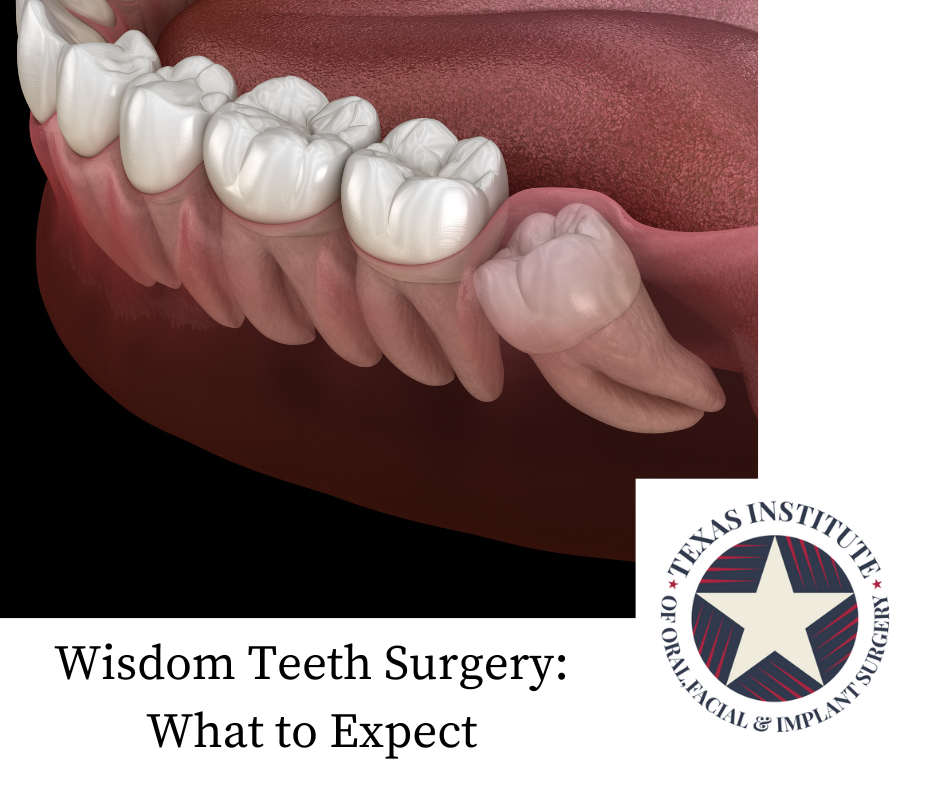Commonly Asked Questions About Dental Implants
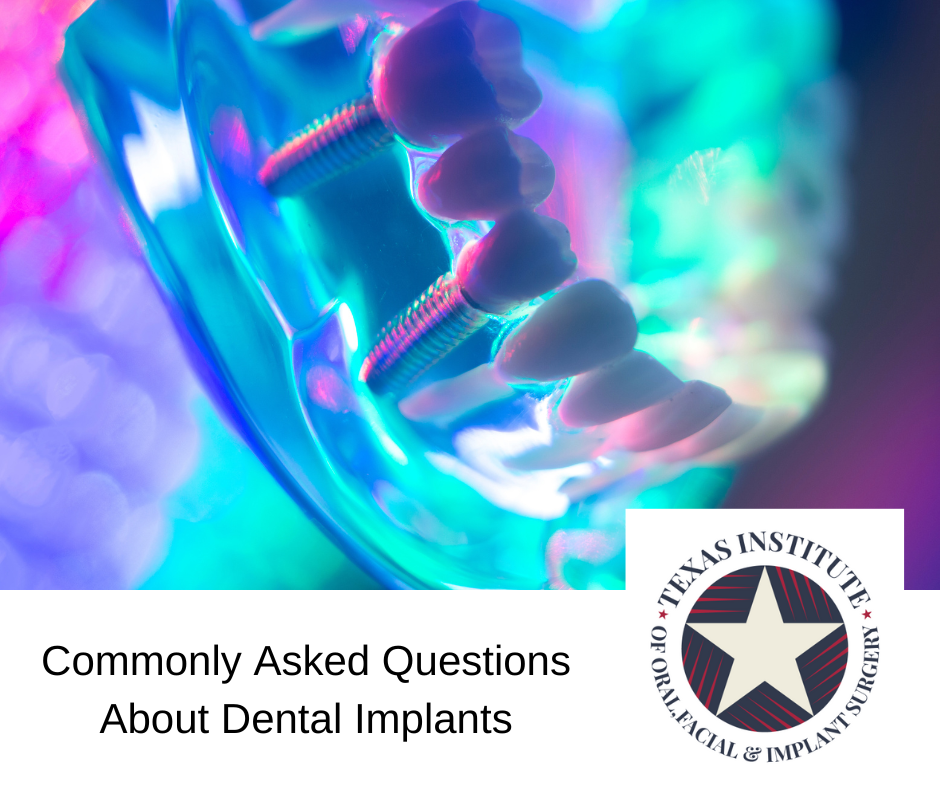
When it comes to restoring your smile, the topic of dental implants often comes with many questions. Dental implants are an advanced solution that has transformed the lives of many of our Texas Institute of Oral, Facial & Implant Surgery patients who were previously struggling with missing teeth. Whether it’s a single tooth or a more complex restoration, dental implants have several benefits that make them a sought-after option for those who want to restore their smile and oral function. This article discusses commonly asked questions about dental implants.
Considering Dental Implants
The decision to opt for dental implants often comes from the need to regain full confidence in your smile and full function in your bite. Unlike prosthetic dentures, dental implants offer a long-lasting solution resembling natural teeth. The ability to eat, speak, and laugh without worrying about your dentures slipping is a huge factor for many patients. Dental implants also promote bone health and prevent the deterioration that often happens with missing teeth.
Can Dental Implants Be Used for a Single Missing Tooth?
For patients dealing with a single missing tooth, dental implants provide a permanent fix that can’t be distinguished from the natural teeth around it. The process involves surgically placing a titanium post into the jawbone and restoring it with a custom-made crown. This approach restores the aesthetics of your smile and ensures that the surrounding teeth remain unaffected.
What’s an All-on-4 Dental Implant?
All-on-4 is an effective treatment that caters to individuals who are missing multiple teeth or a full arch. This innovative technique involves placing four dental implants to secure a full set of replacement teeth in an arch. The procedure is known for its reliability and effectiveness. It offers a stable solution for those seeking a larger restoration of their smile and oral function.
Dental Implants FAQ‘s
Q: Are dental implants painful?
While some discomfort is normal during the recovery stage, the procedure is performed under local anesthesia and causes minimal pain.
Q: How long do dental implants last?
Dental implants can last a lifetime; they are a highly durable and cost-effective solution.
Q: Are dental implants suitable for everyone?
Generally, anyone in good overall health with sufficient jawbone density can qualify for dental implants. Your eligibility depends on several factors and is evaluated by a qualified oral surgeon.
Q. Are dental implants better than dentures?
Dental implants offer a stable and comfortable solution that outshines traditional dentures. They look and feel like real teeth, they don’t need adhesives, and you don’t have to remove them at night.
Q. What’s the recovery time for dental implants?
The healing process varies from person to person, but most patients return to their normal routines within a few days.
Contact Us to Reserve a Consultation
If you’re considering dental implants or have further questions, our Texas Institute of Oral, Facial & Implant Surgery team is here to provide guidance and support. Our team delivers personalized care and tailored solutions for our patients in the Midlothian, Waxahachie, Mansfield, Cedar Hill, and the Greater Ellis, Tarrant, and Dallas County areas. Don’t hesitate to reach out and schedule a consultation to explore the possibilities of transforming your smile through the power of dental implants.
Implant-Supported Dentures: A Modern Alternative for Missing Teeth
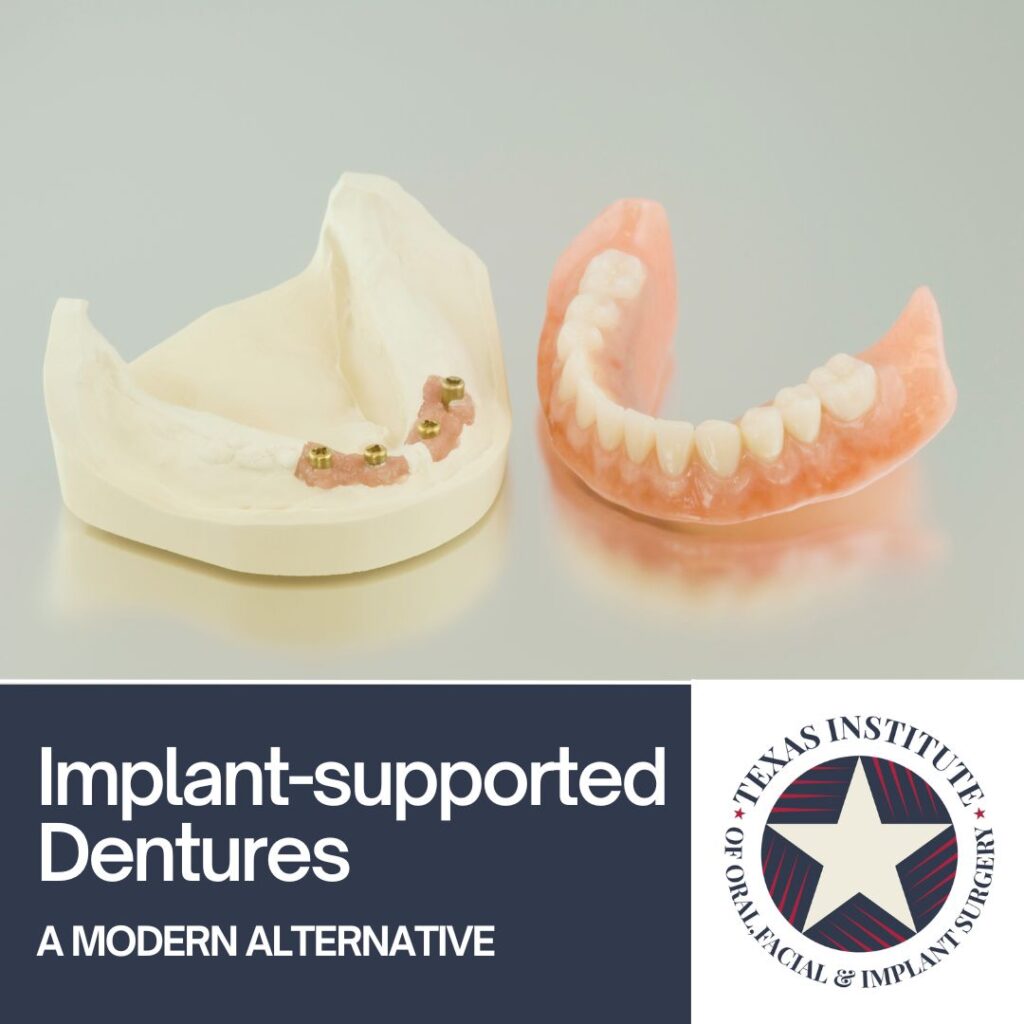
Implant-supported dentures have revolutionized the world of dental prosthetics and denture designs offering a modern alternative that enhances your confidence and quality of life.
As a specialist in implant therapy, Texas Institute of Oral, Facial & Implant Surgery offers a wide variety of implant options to people living in Midlothian, Waxahachie, Mansfield, Cedar Hill, and the Ellis, Tarrant, and Dallas County, TX areas. Even if you assumed that dental implants weren’t right for you, implant-supported dentures are a perfect upgrade from traditional, removable “plate” style dentures.
What are Implant-Supported Dentures?
Implant-supported dentures are a type of hybrid dental prosthetic designed to offer better stability, comfort, and performance. Unlike traditional dentures, which rely solely on adhesives and suction for stability, implant-supported dentures are anchored securely to dental implants surgically placed in the jawbone. They snap in and out of place, so they’re still removable, but the implants hold them securely throughout the day.
The procedure for getting a snap-on denture typically involves the placement of four to six dental implants per arch, depending on your individual needs. Once the implants are securely integrated with the bone, the denture is fitted with special locators that attach to the implants. You can think of them as small clips or buttons that match up with your implants.
Advantages of Implant-Supported Dentures
Enhanced Stability and Comfort:
One of the primary advantages of what’s also called an “overdenture” is its remarkable stability. Traditional dentures can sometimes slip or shift, causing discomfort and embarrassment. Implant-supported dentures stay firmly in place, allowing you to eat, speak, and smile without worrying about your denture moving around.
Improved Chewing Function:
With the added support of dental implants, you can enjoy a more diverse and nutritious diet. Overdentures help restore up to 90% of your natural chewing function, allowing you to savor your favorite foods.
Preservation of Bone Health:
Dental implants stimulate the bone in your jaws, slowing the bone loss that commonly occurs with wearing removable dentures. This not only maintains your facial structure but also ensures the long-term success of your implant prosthesis.
No More Denture Adhesives:
Bid farewell to messy adhesives and the hassle of cleaning pastes or powders off of your denture. Implant-supported dentures are easy to clean and maintain because no strips or adhesives are needed.
Natural-Looking:
Overdentures are customized to match your facial characteristics and aesthetic preferences, providing results that enhance your overall appearance.
Enhanced Self-Confidence:
Implant-supported dentures offer a significant boost to your self-esteem, especially in social settings. You can smile, speak, and laugh without worrying about your dentures slipping, clicking, or falling out around other people.
Long-Lasting Solution:
With proper care and maintenance, implant-supported dentures can last much longer than traditional dentures, because there are usually fewer changes in your bone shape. However, the “locators” underneath your overdenture do need to be replaced over time as they wear out (but this is a simple maintenance procedure!)
Consultations for Implant-Supported Dentures
If you’re considering implant-supported dentures in Ellis, Dallas, or Tarrant County, it’s time to schedule a consultation with Texas Institute of Oral, Facial & Implant Surgery. Call us today for a personalized care plan and affordable financing options.
Dental Implants vs. Other Tooth Replacement Options
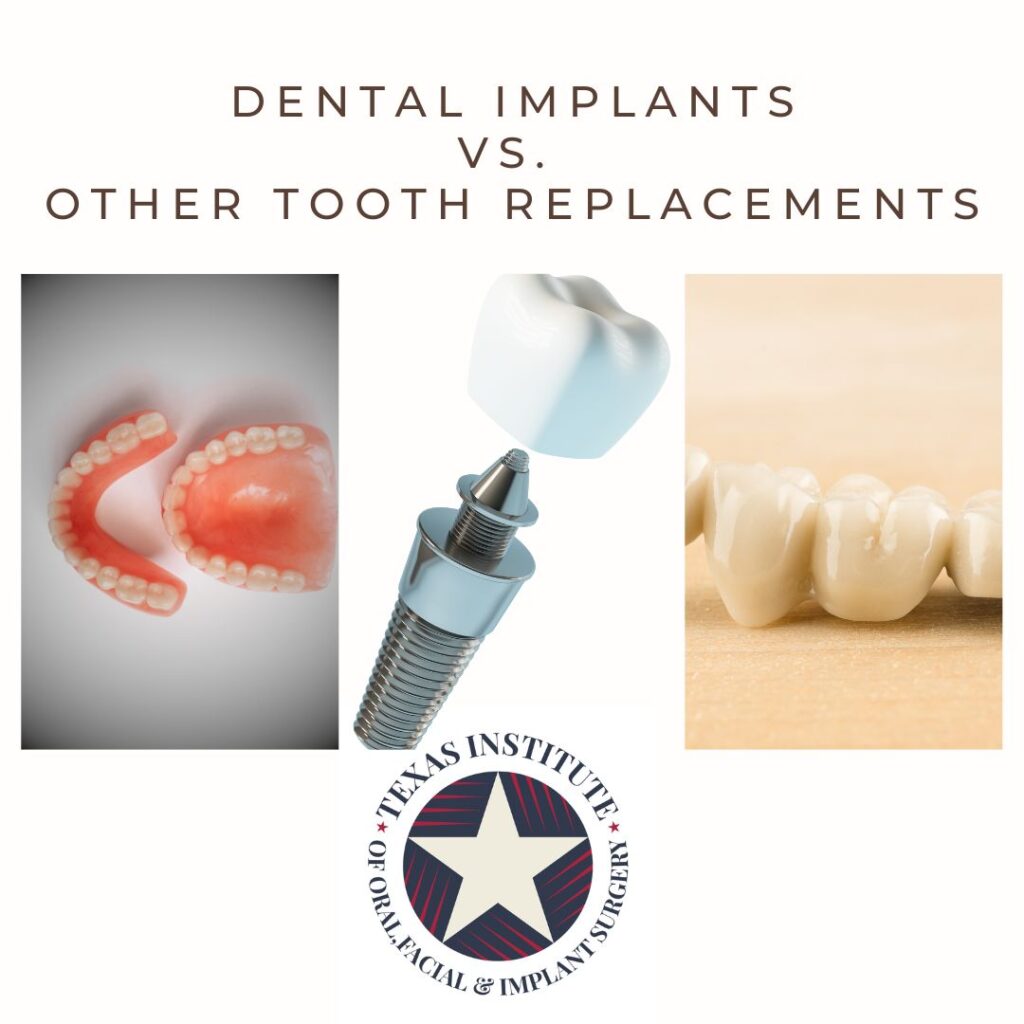
Texas Institute of Oral, Facial & Implant Surgery knows that losing a tooth affects both your smile’s health and your confidence. Fortunately, modern developments in dental care offer several tooth replacement options, with dental implants being one of the most advanced and effective solutions available.
How Dental Implants Serve as a Tooth Replacement
Dental implants are specifically designed for the ability to mimic the natural structure of a tooth. As a tooth replacement, the implant itself serves as the “root” for your new tooth. An attachment called an abutment is then inserted into the top of your implant, which supports the prosthesis—or visible portion of your tooth—above the gumlines.
Depending on how extensive your tooth replacement needs are, our oral surgeon may recommend a single implant with a crown, a pair of implants with a bridge, four implants and an overdenture, or even an “All-on-4” or “All-on-6” style prosthesis.
Most notably, implants offer superior stability and chewing capability compared to all other tooth replacement options.
Tooth Replacement With Bridges vs. Implants
Dental bridges are a traditional solution for single and multiple missing teeth. While they have been widely used for decades, and are still used today, bridges do have certain limitations.
Structurally, fixed bridges consist of one or more artificial teeth (pontics) that are suspended across the area with your missing teeth. Either end of the bridge is held in place by placing crowns on the adjacent teeth. While bridges do offer long-term tooth replacement, they require altering the structure of healthy teeth in order to do so. Dental implants, on the other hand, prevent any alteration to your other teeth because they stand independently. They’re considerably less invasive than a traditional bridge. As a side note, our Midlothian implant specialist can also use implants to support bridges, limiting the total number of implants needed.
Tooth Replacement with Dentures vs. Implants
Traditional dentures are fast and economical prosthetics that work well when you need to quickly replace all of your teeth. While they have been a popular choice for tooth replacement for centuries, dentures do come with several drawbacks:
- Stability: Dentures can slip or shift more easily because they’re held in place with suction. Whereas dental implants are firmly anchored, so there’s no risk of them moving or falling out.
- Bone Health: One of the more problematic issues with dentures is that they don’t slow bone loss and can actually accelerate it in some cases. Implants promote stronger, denser bone, limiting premature aging in your face.
- Maintenance: Dentures require regular maintenance, including cleaning and adhesive application. Not to mention adjustments and relines. But implants are permanent, so you care for them more like natural teeth.
Implant Consultations in Midlothian
At Texas Institute of Oral, Facial & Implant Surgery, we’re committed to providing you with the best care possible. If you’re considering your tooth replacement options, we encourage you to schedule a tooth replacement consultation with our implant specialist. We’ll assess your unique needs and help you make an informed decision about your options. Call us today to learn more!
Best Age for a Dental Implant Consultation
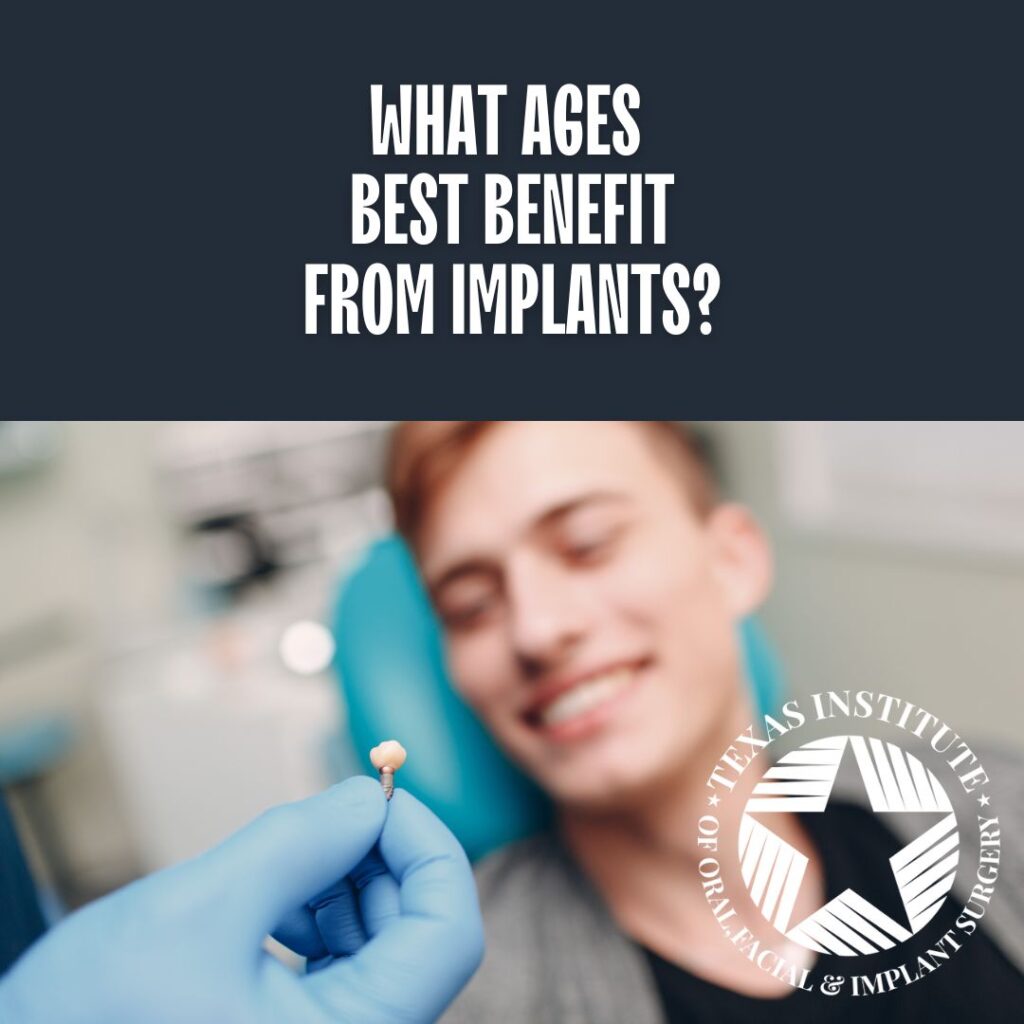
Texas Institute of Oral, Facial & Implant Surgery offers specialized treatment and dental implant consultation appointments for clients in the Waxahachie, Mansfield, Cedar Hill, and the greater Ellis, Tarrant, and Dallas County, TX areas. But one of the more confusing aspects of implants is how old someone should (or shouldn’t) be to get them.
Contrary to popular belief, dental implants aren’t just for a specific age group; they can benefit individuals of various stages of life. That being said, there is an age minimum, because your mouth and bones need to be (mostly) fully developed. The best thing to do is plan a dental implant consultation early, so you can be ready when your facial structures are!
What is a Good Age for a Dental Implant Consultation?
While dental implants offer numerous benefits, not everyone is a candidate for the treatment. Certain criteria, including oral health, medical conditions, and bone density need to be considered. In most cases, the biggest barriers to dental implants are things like underlying health issues or inadequate bone support. But when it comes to your age, our implant specialist may recommend dental implants for various stages of life, including:
20, 30, 40, and 50-Somethings:
Dental implants are wonderful for any adult with missing teeth. Especially young, healthy adults who want to avoid invasive treatments on their surrounding healthy teeth. Whether you’re in your twenties or fifties, a dental implant consultation should be one of your top priorities for restoring your smile.
Dental Implant Consultation for Teenagers (in Some Cases):
In certain situations, older teenagers and college students with fully developed jaw bones and facial structures may be able to consider implants. Especially if they have missing permanent teeth due to trauma or congenital issues.
Older Adults:
You are never too old to get dental implants. Whether you’re a busy retiree, a grandparent, or simply want something better than your dentures, we recommend an implant consultation with our specialist in Ellis County. Dental implants help you enjoy the benefits of a complete, functional smile. Age isn’t a barrier.
As an implant specialist in Midlothian, we see patients of all ages, from their 20s to their 80s and even beyond!
A Dental Implant Consultation Could Change Your Life
Lifelong Solution:
Dental implants are designed to last a lifetime with proper care. This makes them an attractive option for individuals of all ages, as they provide a practically permanent solution to missing teeth. If you’re in your 20s or 30s, this could be one of the best times to make the investment in an implant.
Natural Appearance:
Dental implants not only restore your smile but also look and feel like natural teeth. This aesthetic benefit appeals to individuals of all ages who want a confident and youthful appearance.
Improved Chewing and Speech:
Regardless of your age, dental implants enhance your ability to chew food properly and speak clearly, which is essential for maintaining a healthy diet and effective communication. Chewing with implants is far better than with a full “plate” style denture.
Schedule a Dental Implant Consultation Today
You’re not too old for dental implants and chances are you aren’t too young for them either. Call Texas Institute of Oral, Facial & Implant Surgery today for a no-pressure evaluation. Flexible payment options are available!
Who Can Get Dental Implants: A Comprehensive Guide
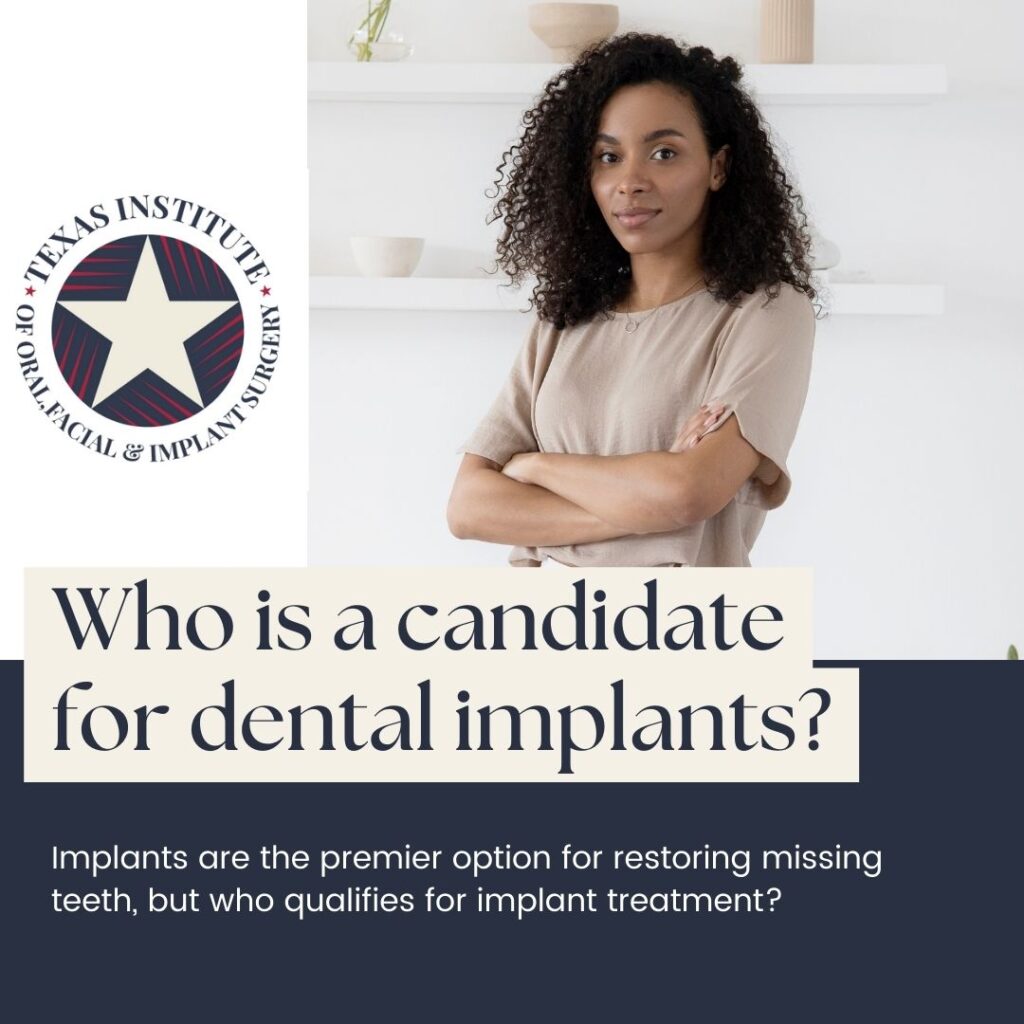
At Texas Institute of Oral, Facial & Implant Surgery in Midlothian, TX, we understand the importance of a healthy and confident smile. Dental implants have revolutionized the field of restorative dentistry, offering the next best thing to having beautiful, natural teeth. Implants in Ellis County are fully functional and aesthetically attractive, offering everything from single tooth replacement to complete oral rehabilitation. But not everyone qualifies for this innovative treatment. Here’s what you need to know going into a consultation with our oral surgeon:
Understanding How Implants Work
Dental implants consist of three main components: the implant itself (a titanium post that replaces the tooth root), an abutment that connects to the top of your implant, and the custom-made restoration that mimics the appearance and function of a natural tooth above your gum tissues.
Ideal Candidates for Dental Implants
Good Oral Health:
Candidates with a history of maintaining good oral hygiene are typically prime candidates for dental implants. Healthy gums and a strong jawbone are essential for successful implantation. However, even if you have experienced some bone loss, techniques like bone grafting or sinus augmentation can often make dental implants feasible. The key is to work with a specialist who offers these services, as they may not be available with a general dentist.
Adults of All Ages:
There’s no cut-off age for getting dental implants. Even if you’re retired or a busy grandparent, you can still consider implants! However, we do want your mouth to be fully developed, so younger teenagers will need to wait before considering this treatment.
Non-Smokers Preferred:
Smoking can hinder the healing process after implant surgery and increase the risk of implant failure. While smokers can still be considered for dental implants, quitting smoking before the procedure can improve the chances of success.
Stable Health Conditions:
Certain systemic conditions like uncontrolled diabetes or autoimmune disorders might affect the healing process. However, every case is unique, and a consultation with our experienced Midlothian implant specialist can provide clarity regarding your eligibility.
Commitment to Aftercare:
Dental implants require regular maintenance, just like natural teeth. Regular brushing, flossing, and routine dental check-ups are crucial to ensuring the longevity of your implant.
Exploring Case-by-Case Considerations
Every situation is unique, and our skilled oral surgeon will take a personalized approach to determine the most suitable treatment plan for your circumstances. Even if you’ve been told in the past that you don’t qualify for dental implants, we encourage you to visit our Midlothian expert for a second opinion.
Schedule Your Consultation Today
Our innovative technology and expert team make dental implants a possibility for adults throughout the Ellis, Dallas, and Tarrant County regions. Whether you’ve lost teeth due to injury, decay, or other factors, dental implants could be the answer you’ve been searching for.
At Texas Institute of Oral, Facial & Implant Surgery in Midlothian, TX, our expert team is committed to helping you achieve the smile you deserve. Contact us to schedule your consultation today and take the first step towards a more confident and fulfilling future with dental implants.
Ways Dental Implants Resemble Natural Teeth: A Seamless Smile Solution
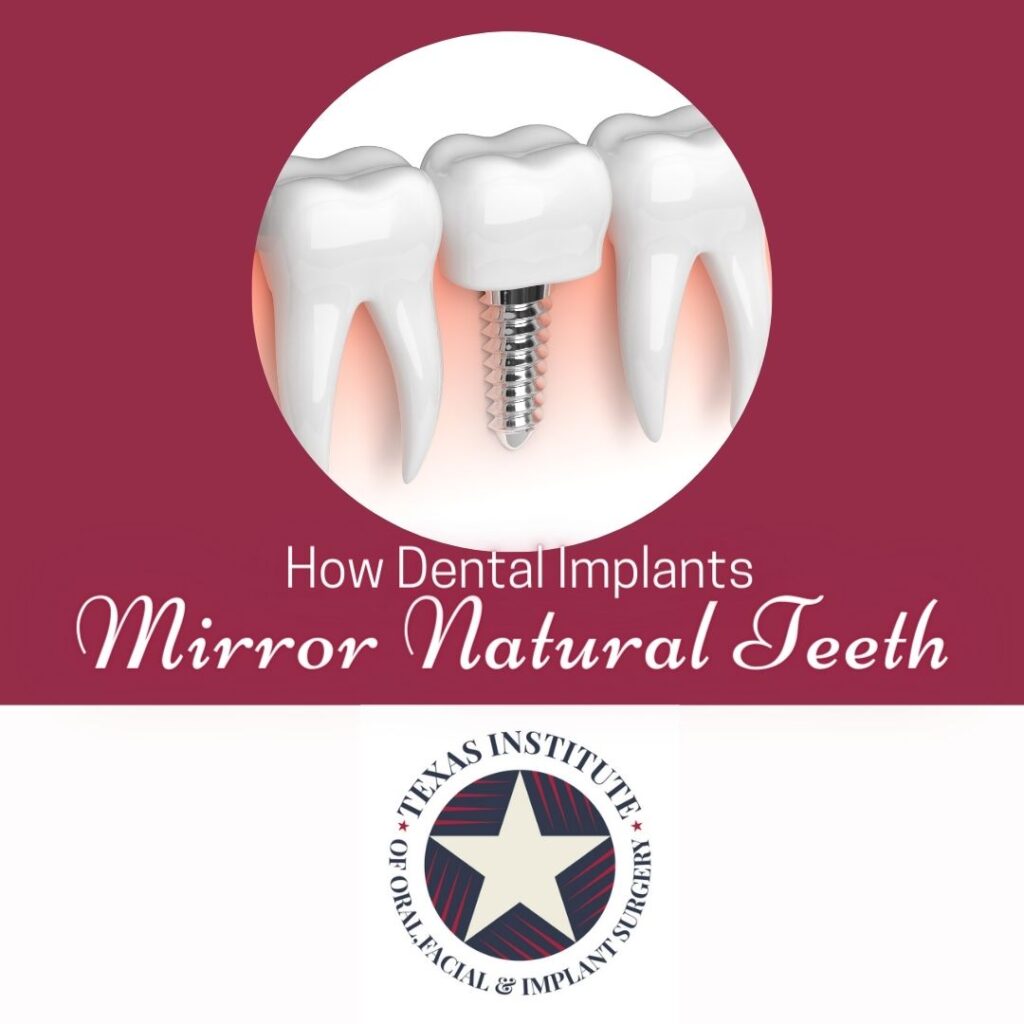
Ellis County dental implants have redefined the possibilities for tooth replacement, offering a solution that goes beyond aesthetics to encompass newfound functionality. At Texas Institute of Oral, Facial & Implant Surgery in Midlothian, TX, we take pride in our ability to provide you with dental implants that seamlessly resemble and function like natural teeth. Your journey to a confident and natural smile begins here.
The Remarkable Resemblance to Natural Teeth
Dental implants have revolutionized dentistry by offering a tooth replacement solution that closely resembles natural teeth in numerous different aspects. From their appearance to their strength, dental implants stand out as an exceptional choice for those seeking a confident and functional smile.
Aesthetic Harmony with Natural Teeth
When it comes to aesthetics, your implant restoration—be it a crown, bridge, or something else—is crafted with a keen eye for detail. For example, single dental crowns attached to individual implants are customized to match the shade, shape, and size of your existing teeth. This meticulous approach ensures that the implant seamlessly integrates into your smile, making it virtually impossible to distinguish from your natural teeth. Whether you’re engaging in social interactions or simply smiling in front of a mirror, the cohesive look of dental implants will give you the confidence to be who you are, wherever you are.
Solid Bite and Chewing Power
One of the most remarkable features of dental implants is their ability to replicate the strength and function of natural teeth. In fact, implants are even stronger than healthy teeth. The titanium implant post, which fuses with the jawbone through osseointegration, provides a stable foundation for your fixed dental crown or other restoration. This stability allows you to bite and chew with confidence, just as you would with your natural teeth. You can enjoy your favorite foods without worry, knowing that your dental implants can handle everything from apples to steak.
Clear Communication
Dental implants not only contribute to your appearance and eating habits but also play a role in your speech and articulation. Missing teeth can lead to speech difficulties, affecting your ability to pronounce certain words or sounds. Dental implants help maintain proper tongue placement and speech patterns, ensuring that your speech remains clear and natural without bulky “plates” or dentures getting in the way.
Bone Health
A lesser-known benefit of dental implants is their role in preserving bone density and health. When a tooth is lost, the underlying jawbone will usually deteriorate. Dental implants provide the necessary stimulation by mimicking the role of natural tooth roots. This stimulation encourages healthy bone growth and prevents bone loss, which is crucial for maintaining your facial structure and overall oral health.
Easy Maintenance Similar to Natural Teeth
Caring for dental implants is straightforward and practically the same as brushing and flossing routine for natural teeth. Good home care and routine dental check-ups are all that’s needed to keep your dental implants in excellent condition. With proper maintenance, dental implants can last a lifetime, giving you a lasting solution that’s worth the investment.
Schedule a Consultation Today
At Texas Institute of Oral, Facial & Implant Surgery, we’re committed to helping you achieve a smile that not only looks great but also functions naturally. We’ll guide you through the care process, answer your questions, and create a personalized treatment plan tailored to your unique needs. Contact our Midlothian implant specialist today to get started.
The Dental Implant Process: A Pathway to Confident Smiles
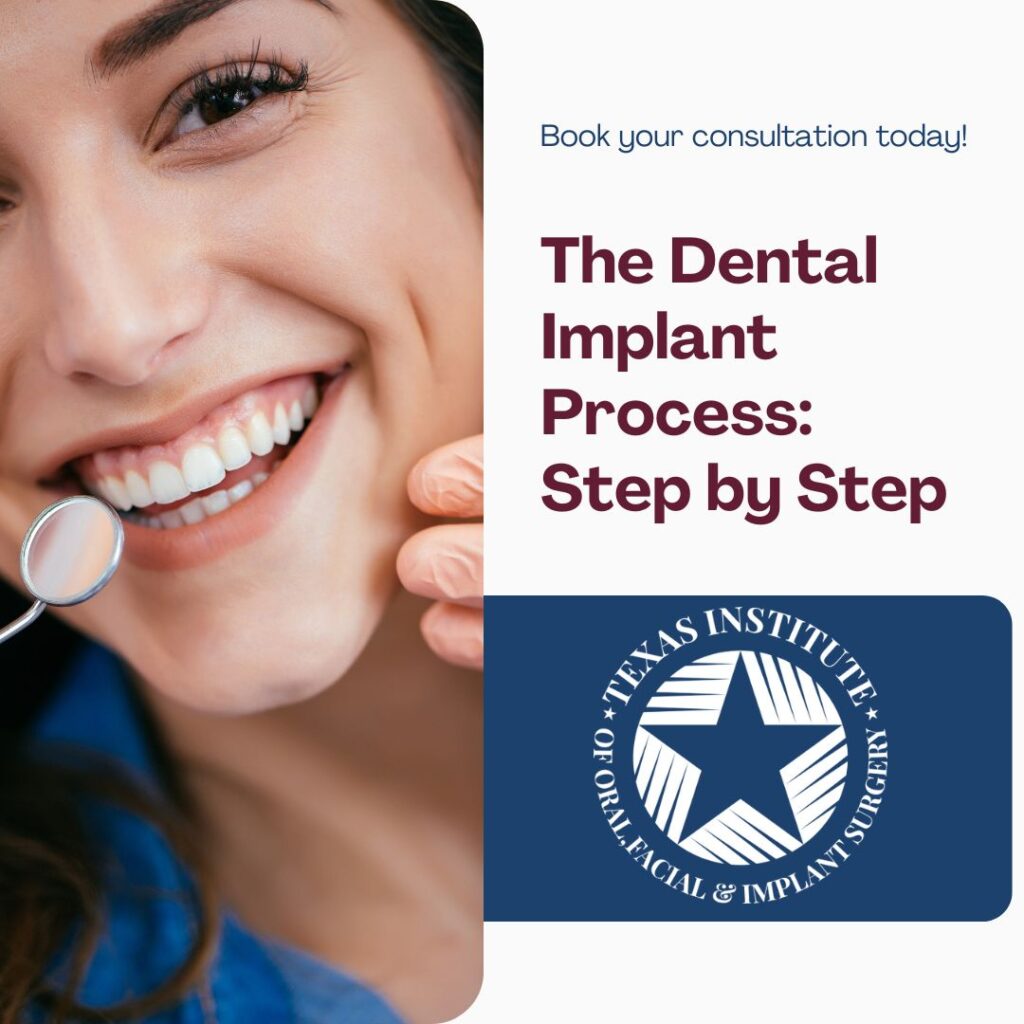
The dental implant process at the Texas Institute of Oral, Facial & Implant Surgery in Midlothian, TX, is a testament to our commitment to providing cutting-edge oral care. With a seamless blend of technology, expertise, and personalized treatment planning, our Ellis County implant clinic is the ideal destination for those seeking to restore their smiles and enhance their quality of life. Today’s transformative dental implants are the modern solution to replace missing teeth and restore your oral health.
Understanding Dental Implants
Dental implants are innovative and durable replacements for missing teeth. They consist of three main components: the implant, the abutment, and the dental crown (or other restoration, depending on your circumstances.) The implant is typically made from a biocompatible material called titanium. After the implant fuses with your surrounding bone, the abutment connects the crown or other restoration to the top of your implant. Your restoration is custom-made to blend seamlessly with your natural teeth, both in terms of appearance and function.
The Dental Implant Process: Step by Step
1. Initial Consultation
Your smile journey begins with a personalized consultation at our Midlothian dental implant clinic. During this meeting, our expert will evaluate your oral health, discuss your treatment goals, and determine your eligibility for dental implants. This is a great opportunity for you to ask questions and gain a comprehensive understanding of the procedure.
2. Treatment Planning
Once we’ve determined that you’re a candidate for dental implants, we will develop a customized treatment plan tailored to your specific smile. This plan takes into account factors such as the number of missing teeth, the condition of your bone, the type of restoration you prefer, and things like your insurance coverage and/or financing.
3. Surgical Placement of Your Dental Implant
The implant placement is a surgical procedure performed under local anesthesia to ensure your comfort. However, deeper dental sedation is also available. Our oral surgeon uses advanced techniques and technology to precisely position the implant posts within your jawbone.
4. Osseointegration Period of the Dental Implant
After the implant placement, we wait for the surrounding bone to fuse and integrate with the surface of your implant. The duration of this healing phase varies from patient to patient but typically takes a few months. Once complete integration is achieved, your new dental implant can support extremely heavy biting and chewing forces, making it even stronger than a natural tooth.
5. Abutment and Crown Placement
Once the implant has successfully integrated, the abutment is attached to the implant post. This abutment serves as a connector between the implant and the final dental crown. The dental crown, meticulously crafted to match your natural teeth, is then secured onto the abutment. The result is a functional, comfortable, and aesthetically pleasing replacement tooth.
Schedule Your Consultation Today
At Texas Institute of Oral, Facial & Implant Surgery in Midlothian, we understand the permanent impact that missing teeth can have on your smile. Our dedicated team is here to guide you through every step of the dental implant process, ensuring that you feel informed, comfortable, and empowered throughout your transformative journey! If you’re ready to rediscover the joy of eating, speaking, and smiling with confidence, schedule your consultation today.
Q&A Dental Implant Treatment, Midlothian, TX
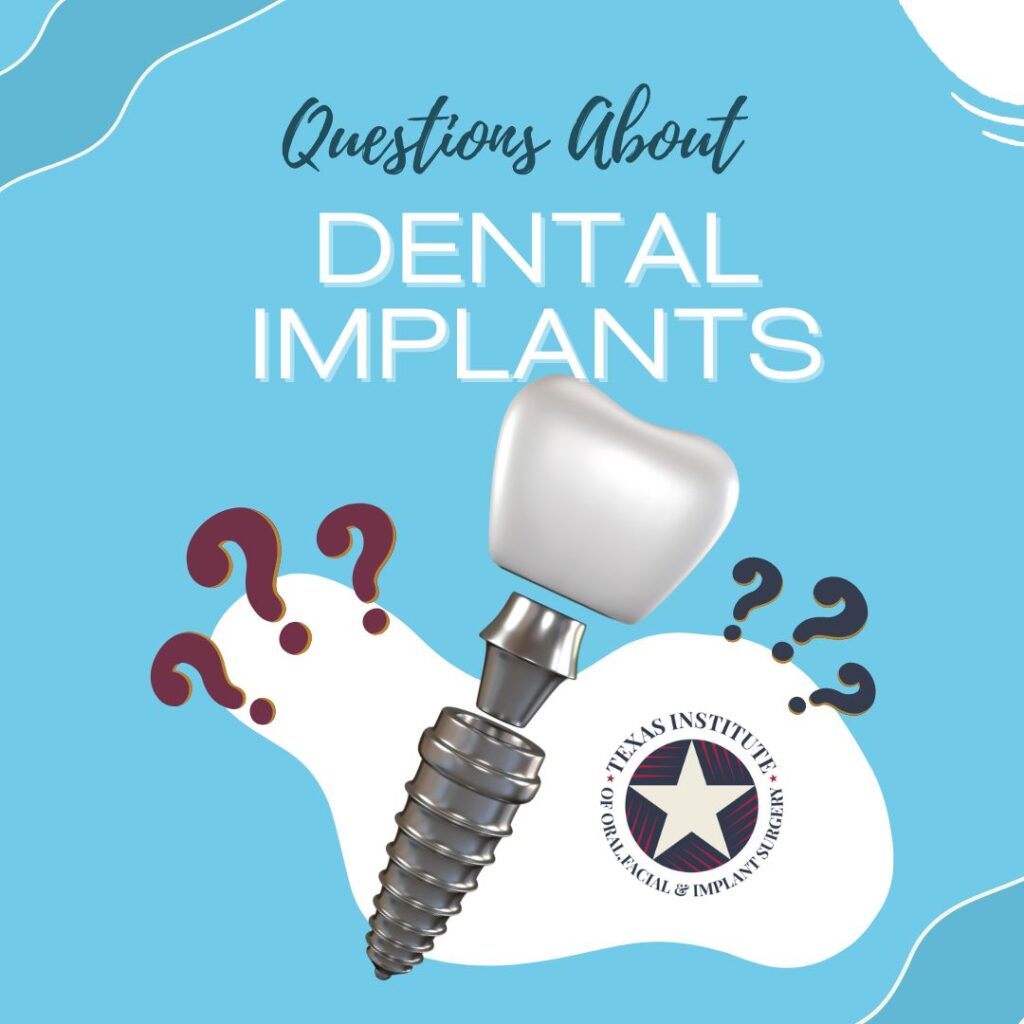
Texas Institute of Oral, Facial & Implant Surgery in Midlothian is happy to answer all of your questions about dental implants; that way, you make the best-informed decision about your smile’s future. Today, we are going to review some of the most frequently asked questions regarding dental implant treatment in Ellis County to help you feel confident about your choices for tooth replacement treatments.
What is a dental implant?
A dental implant is easily described as a prosthetic tooth. It essentially includes a structure that resembles your tooth’s natural root. This base is surgically placed into the bone and then a crown is attached to it via an abutment. When all three pieces work together, it makes up the shape and size of a real tooth.
Why would you need a dental implant?
Dental implants are most known for being used as a replacement for a single missing tooth. However, they can also be used for replacing several teeth or all of your teeth! While the restorations and number of implants used differ slightly from one another, they can be adapted to reconstruct your smile regardless of your needs. Best of all, implants provide a stable and long-lasting alternative to removable dentures or fixed bridges which occasionally need to be replaced.
Does it hurt to get a dental implant?
Getting dental implants is a minimally invasive procedure for most straightforward cases. This placement is done using a dental anesthetic to numb the area, so no pain should be felt during the procedure. Some patients experience some mild discomfort or soreness after the anesthetic wears off. However, many patients report this to be manageable with over-the-counter pain medications. As a sedation dentist in Midlothian, we can arrange to have your entire implant surgery completed under in-house sedation, even if it’s a more complex case involving multiple implants.
How long will a dental implant last?
Dental implants often last 20 years or longer! If you care for them properly, they can last for the rest of your life. It’s important to note that this is dependent on your oral hygiene habits, underlying health issues, and your overall lifestyle. We’ll show you how to care for your implants so that they last as long as possible. Compared to bridges or dentures, implants offer the best return on investment because of their long-term predictability.
Why should I get a dental implant?
Losing a tooth affects your entire smile. Not only do the neighboring teeth start to shift inward, but the bone in that space begins to shrink (resorb) as well. This can also lead to premature aging in your face. Dental implants will help you to avoid these problems by mimicking and replacing the function of your natural tooth. Plus, there’s a good chance your investment will last for the rest of your life; other tooth replacements can’t do that.
If you’re considering dental implants or want to find out if you’re a candidate for implant treatment, reserve a no-obligation consultation with our Midlothian specialist today. Flexible financing is also available! Call now.
Tooth Loss: Benefits of Single Dental Implant
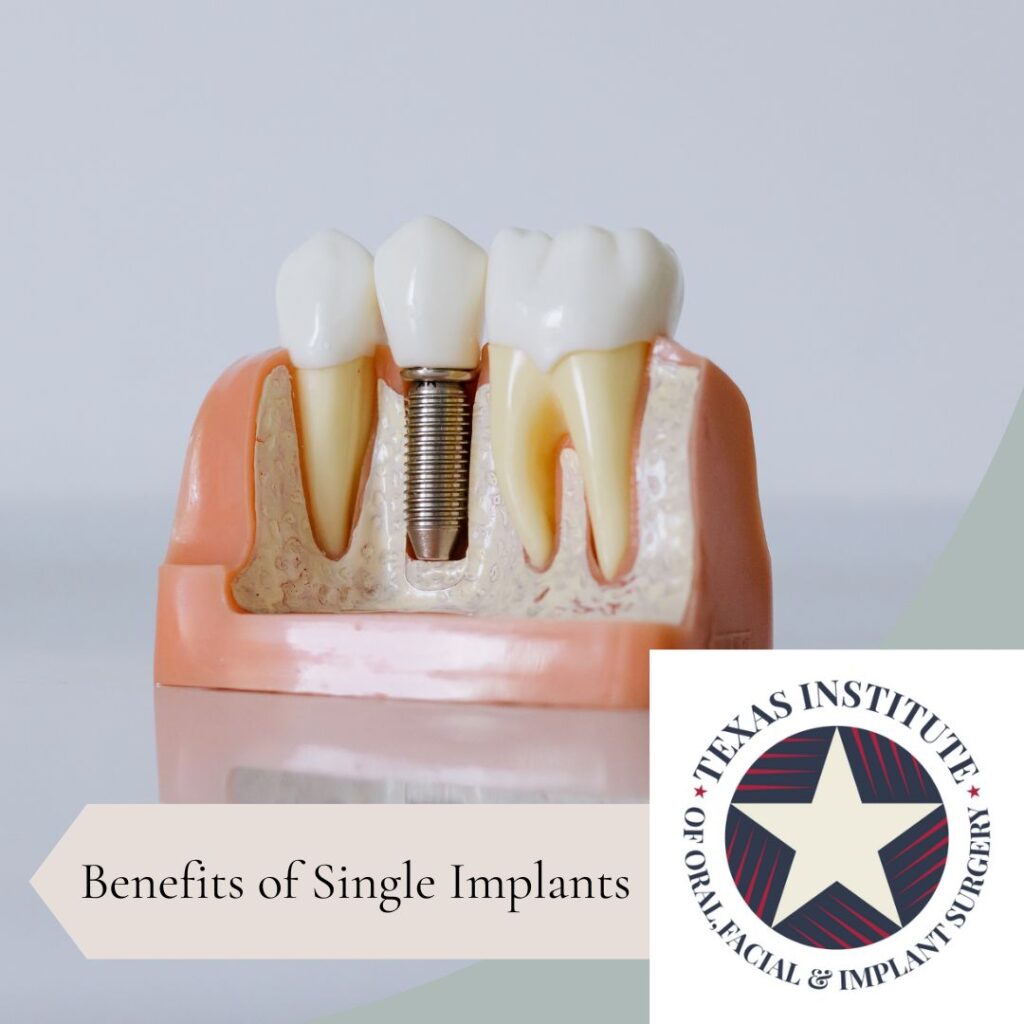
If you lost a tooth, you may feel a little “lost” yourself when it comes down to how to replace it. A dental implant can be an excellent solution, especially if you want the best return on your investment. Texas Institute of Oral, Implant & Facial Surgery in Midlothian provides advanced dental implant care, ranging from single tooth replacement to full mouth rehabilitation. We have something for everyone!
Addressing Tooth Loss With a Dental Implant
Our teeth are pretty amazing when you think about how much they contribute to our quality of life. They help us enjoy our favorite foods, share a smile with others, and can significantly boost our confidence. It’s understandable to feel upset or even embarrassed when you lose one (or worse, several.) Unfortunately, none of us are completely immune to tooth loss. Some of the most common reasons people lose teeth include situations like:
- Extensive tooth decay
- Periodontal disease
- Traumatic injuries
- Failed root canal treatment
- Infection
When a tooth or multiple teeth are extracted or fall out, you can have trouble chewing, experience significant bone loss, develop speech issues, and feel embarrassed when you’re around other people. Luckily, dental implants can save the day because of how lifelike they are and predictable the treatment is.
What You Need to Know About Getting a Dental Implant
Dental implants are restorations made to resemble an anatomical tooth root. The implant itself is set into the bone, next to any other teeth you have. Implants typically have three main parts to them, including the body of the implant that rests in your jaw, the attachment abutment that connects to the top of the implant, and the artificial “tooth” portion, such as the crown or bridge that attaches on top of the implant abutment.
Dental implants are a fantastic option that can significantly improve your diet, speech, and overall quality of life after losing teeth. Since they look and function just like natural teeth, it’s no wonder dental implants have been the standard of care in restoring smiles. While there are other options to replace missing teeth, such as bridges, and removable dentures, dental implants outshine these options as they mimic a natural tooth the most! They are also non-invasive to your other teeth, making them much better than getting a fixed bridge or wearing a prosthesis that clasps onto and rubs adjacent teeth. Best of all, your implants have the same (if not better) chewing ability as natural teeth do, so you don’t have to worry about cutting your food up into small bites or sticking with soft textures.
If you’re looking for the best dental implants in Midlothian, visit our Ellis County specialist at Texas Institute of Oral Facial & Implant Surgery. Reserve your consultation today to discuss what will work best for you, your oral health goals, and your dental implant needs.




